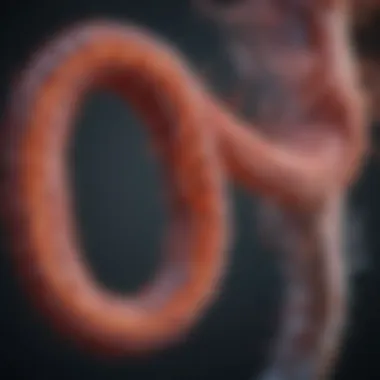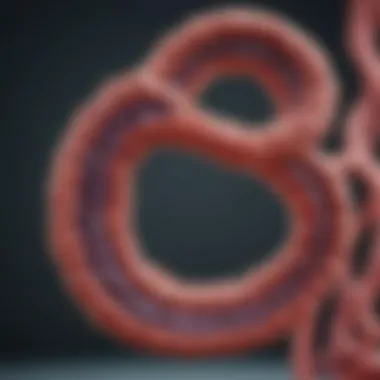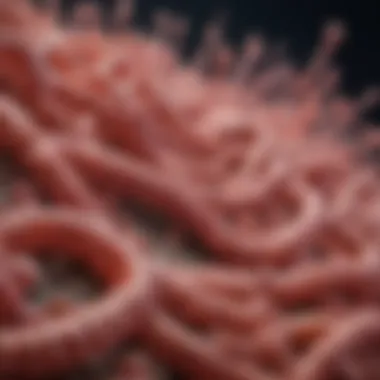Kras Wild Type Colon Cancer Treatment Analysis


Overview of Research Topic
Brief Background and Context
Colon cancer is one of the leading causes of cancer-related deaths globally. It is known to have various subtypes, each with distinct biological characteristics and treatment responses. Among these, Kras wild type tumors present a unique challenge and opportunity for intervention. Kras gene mutations are implicated in numerous cancers but understanding the implications of the wild type status in colon cancer is crucial for tailoring effective treatments. The effective management of Kras wild type colon cancer has gained significant attention, as current research highlights the importance of personalized medicine in enhancing patient outcomes.
Importance in Current Scientific Landscape
The treatment landscape for colon cancer is evolving rapidly. As researchers uncover nuances in cellular signaling and tumor behavior, the focus on biomarker testing is expanding. Kras wild type status is a critical biomarker in determining the appropriateness of certain therapies. The understanding of how this status impacts treatment efficacy is essential not only for clinical decisions but also for the development of future therapies. As more patients are diagnosed, the need for targeted approaches to treatment becomes increasingly important. Insights gained from studying Kras wild type tumors contribute significantly to both clinical practices and ongoing cancer research.
Methodology
Research Design and Approach
This article adopts a literature review approach, synthesizing existing research on the management of Kras wild type colon cancer. By analyzing clinical trial data alongside current treatment protocols, the study highlights the best practices and emerging strategies in treatment. Various studies are referenced to provide a comprehensive overview, allowing for a nuanced understanding of the current treatment implications.
Data Collection Techniques
Data for this review are sourced primarily from peer-reviewed journal articles, clinical trial registries, and expert consensus guidelines. Rigorous evaluation of the literature ensures that the most relevant and impactful findings are included. The integration of clinical evidence enhances the argument for specific treatment modalities and future research directions.
"Understanding the biological behavior of Kras wild type tumors is critical to effectively manage colon cancer and improve patient outcomes."
The exploration of this area aims to communicate the significance of biomarker testing in treatment choice, providing clarity on current practices and future implications.
Foreword to Kras Wild Type Colon Cancer
Kras wild type colon cancer is a significant area of study due to its distinct biological characteristics and treatment responses. Understanding the intricacies of this cancer type is vital for healthcare professionals, researchers, and educators. It serves as a context to inform treatment strategies and clinical approaches that reflect the latest discoveries in oncological science.
The Kras gene plays a critical role in cell growth and division. It's important to differentiate between the wild type and mutated forms of Kras, as this has implications for patient prognosis and treatment options. Wild type status suggests a different therapeutic landscape, often allowing for the utilization of targeted therapies that may not be effective in Kras-mutated tumors.
Furthermore, the prevalence of colon cancer with wild type Kras status underscores the need for tailored treatment. Epidemiological studies indicate how common this cancer type is and how it can disproportionately affect certain populations. This demographic data is instrumental in shaping screening strategies and preventive measures.
The complexity of Kras wild type colon cancer emphasizes the relevance of continuous research. As treatments evolve and new therapies are developed, it becomes imperative to stay informed about emerging strategies that enhance patient outcomes. This section lays the foundation for the detailed exploration of Kras implications, epidemiology, and treatment modalities in subsequent sections.
Understanding Kras and its Implications
The Kras gene, part of the RAS gene family, is pivotal to many cellular processes. When functioning normally, it regulates cell proliferation and differentiation. However, it can be subject to mutations, and in the case of wild type, this means the gene is intact. This provides insights into how the cancer progresses and responds to treatment. Understanding the functional behavior of wild type Kras has a direct impact on clinical decision-making.
Research indicates that patients with wild type Kras tumors might respond more favorably to certain therapies like anti-EGFR monoclonal antibodies, including Cetuximab and Panitumumab. The absence of mutations suggests a better likelihood of responding to these treatments, thereby improving overall survival rates. In stark contrast, patients with mutated Kras often have poorer outcomes due to the tumor's inherent resistance to these therapies.
Epidemiological Data on Colon Cancer
Epidemiological studies present a clearer picture of the burden of Kras wild type colon cancer. Data shows that colon cancer rates can vary significantly based on factors such as geographic region, age, and ethnic background. Such statistics are essential for identifying high-risk groups and devising targeted public health initiatives.
- According to various cancer registries, colon cancer ranks among the most prevalent cancers globally, with a notable incidence in both developed and developing countries.
- The incidence of the wild type Kras form can be particularly high among younger populations and women, warranting focused research on risk factors associated with these demographics.
- Furthermore, lifestyle factors such as diet, exercise, and genetic predisposition contribute to the overall risk of developing colon cancer.
Understanding these trends in incidence and demographic distribution not only helps improve screening and prevention strategies but also enhances the efficacy of treatment paradigms tailored to specific populations. This is crucial for informing both local and global health policies and research priorities.
Molecular Characteristics of Kras Wild Type Colon Cancer
The molecular characteristics of Kras wild type colon cancer hold significant importance in understanding the nuances of its treatment and progression. This type of colon cancer, characterized by the absence of Kras mutations, exhibits specific biological traits that influence therapeutic responses. Understanding these characteristics is vital for both clinicians and researchers as they seek to optimize treatment strategies and improve patient outcomes.
Genetic Profiling and Kras Status
Genetic profiling has become a cornerstone in oncology, particularly for Kras wild type colon cancer. The absence of Kras mutations indicates a distinct tumor biology, often leading to different treatment pathways. This status allows oncologists to assess the tumor's characteristics and predict the likelihood of response to therapies.
In clinical practice, testing for Kras status usually occurs alongside other biomarker assessments, allowing for comprehensive tumor profiling. The identification of wild type Kras can influence the choice of treatment, especially regarding targeted therapies like cetuximab and panitumumab, which are less effective in patients with Kras mutations. Therefore, obtaining genetic information about a patient's tumor is crucial for tailoring treatment plans.


Recent studies emphasize the relevance of comprehensive genomic profiling that not only includes Kras but also assesses other actionable mutations. This holistic approach aids in identifying potential targeted therapies, thereby enhancing therapeutic efficacy.
In summary, genetic profiling is essential for understanding the landscape of Kras wild type colon cancer, shaping treatment decisions, and optimizing patient outcomes.
Pathways Involved in Tumor Progression
The pathways involved in the progression of Kras wild type colon cancer are complex and multifaceted. These pathways influence how the cancer cells grow, spread, and respond to various treatments. Understanding these mechanisms is essential for developing effective treatment strategies.
Several key pathways are notably implicated in the behavior of Kras wild type tumors. One of the prominent pathways is the epidermal growth factor receptor (EGFR) pathway. In Kras wild type cancers, the engagement of EGFR plays a crucial role in proliferative signaling. Targeting this pathway with EGFR inhibitors has shown promise in clinical settings.
Furthermore, additional signaling pathways, such as the PI3K/Akt and MAPK pathways, also contribute to tumor progression. These pathways interact with numerous cellular processes, including cell survival and proliferation. Their involvement in Kras wild type cancers highlights the need for targeted approaches that can disrupt these signaling cascades effectively.
"Targeting specific pathways may provide new avenues for treatment in Kras wild type colon cancer, enhancing therapeutic outcomes."
Current Treatment Modalities
The realm of treatments for Kras wild type colon cancer illustrates a dynamic clinical landscape. Effectively addressing this subtype requires a deep understanding of various methodologies and their implications. Treatment modalities not only influence survival rates but also affect the quality of life of patients. The multifaceted approach includes chemotherapy, targeted therapies, and immunotherapy, with each offering distinct benefits and considerations essential for treatment planning.
Chemotherapy Approaches
Chemotherapy remains a cornerstone in the management of colon cancer, particularly for advanced stages. Traditional regimens often involve combinations such as FOLFOX, which includes fluorouracil, leucovorin, and oxaliplatin. The selection of agents can be influenced by patient factors, including previous treatments and overall health.
The regimen's effectiveness usually hinges on its ability to target rapidly dividing cancer cells. However, it is crucial to consider the side effects, which can be substantial. Common adverse effects include nausea, fatigue, and immunosuppression, which may necessitate dose adjustments or supportive care strategies.
- Key Considerations in Chemotherapy:
- Benefits of Chemotherapy:
- Patient’s overall health and previous treatment history
- Potential side effects and management strategies
- Duration and response to the treatment
- Proven efficacy in shrinking tumors and delaying progression
- Potentially enhances the effects of other therapies when used in combination
Targeted Therapy and Immunotherapy
Targeted therapy represents a transformative approach in cancer management, particularly for Kras wild type tumors. The focus lies on specific molecular targets that drive tumor growth. For instance, drugs like cetuximab and panitumumab work by inhibiting the epidermal growth factor receptor (EGFR), a protein that can encourage cancer cell growth. These therapies have demonstrated improved outcomes in certain populations, especially when tumors express wild-type Kras.
On the other hand, immunotherapy has gained traction as a viable option for some patients. Agents like nivolumab and pembrolizumab harness the body's immune system to recognize and combat cancer cells. Their success, however, may depend on the tumor's microenvironment and the presence of specific biomarkers like microsatellite instability (MSI).
- Important Aspects of Targeted and Immunotherapy:
- Identification of specific biomarkers (e.g., MSI status)
- Tailoring treatment based on tumor characteristics
- Assessment of immune-related side effects
"The advancement in therapies targeting specific molecular pathways marks a significant shift in the treatment of colon cancer, emphasizing the need for personalized approaches."
Ultimately, the integration of chemotherapy, targeted therapy, and immunotherapy necessitates a tailored approach guided by multidisciplinary consultation. Each modality offers unique advantages and challenges that must be meticulously navigated to optimize patient outcomes in Kras wild type colon cancer.
Clinical Guidelines and Recommendations
Clinical guidelines in the context of Kras wild type colon cancer are crucial for establishing a structured approach to treatment. These guidelines serve not only as a framework for healthcare providers but also offer patients important insights into their treatment options. They can help ensure that therapies are applied consistently, based on the best available evidence. Furthermore, adhering to these guidelines can significantly improve patient outcomes by promoting tailored care approaches that account for individual patient profiles, including genetic characteristics and disease stage.
The importance of these clinical recommendations cannot be overstated. They synthesize expert opinions and findings from research studies, providing a reliable basis for clinical decision-making. By leveraging guidelines, oncology professionals can navigate the complexities of treatment choices available for this specific type of colon cancer.
National Comprehensive Cancer Network (NCCN) Guidelines
The NCCN guidelines play a pivotal role in shaping the standards of care for patients with Kras wild type colon cancer. This organization is esteemed for developing evidence-based clinical practice guidelines that aim to improve treatment interventions. The NCCN incorporates data from myriad sources, including clinical trials, meta-analyses, and expert consensus to provide detailed recommendations on various treatment modalities.
In the realm of Kras wild type tumors, the NCCN guidelines outline specific chemotherapy regimens, targeted therapies, and immunotherapy options based on disease staging. They also emphasize the significance of biomarker testing which can impact treatment planning significantly. Recommendations are frequently updated to reflect the latest research findings, which is crucial in a field that evolves rapidly.
Following these guidelines can enhance treatment efficacy and increase access to promising new therapies for patients. More importantly, they provide a consistent template for healthcare professionals, ensuring high-quality care across different institutions.


European Society for Medical Oncology (ESMO) Guidelines
The ESMO guidelines offer another authoritative perspective on the management of Kras wild type colon cancer. This organization is committed to advancing cancer care through comprehensive guidelines that are informed by extensive research and clinical experience. ESMO emphasizes the importance of integrating multidisciplinary approaches for optimal patient management.
Their guidelines cover various aspects such as surgical interventions, systemic therapies, and follow-up protocols. Similar to the NCCN, ESMO's recommendations include biological assessments to guide treatment selection. This not only increases the likelihood of therapeutic success but also helps in minimizing unnecessary side effects from ineffective treatments.
Additionally, ESMO focuses on enhanced quality of life for patients. Their guidelines often include recommendations for supportive care and palliative measures, acknowledging that cancer treatment extends beyond merely targeting the disease. This holistic perspective is critical for caring for patients and addressing their needs throughout their treatment journey.
Following updated clinical guidelines enhances patient outcomes and promotes a standardized approach to care.
Biomarkers and Their Role in Treatment Selection
Biomarkers play a pivotal role in the treatment landscape of Kras wild type colon cancer. They are biological indicators that provide insights into the disease’s characteristics and behavior. These indicators are crucial in tailoring treatment strategies for individual patients. Understanding how biomarkers influence treatment decisions can enhance outcomes and minimize unnecessary side effects.
Importance of Biomarker Testing
Biomarker testing is essential for identifying specific characteristics of a patient’s tumor. This process can guide the selection of targeted therapies and predict responses to various treatments. For instance, testing for the presence of certain proteins or genetic mutations can indicate which chemotherapy agents may be effective.
Here are several key advantages of biomarker testing:
- Personalized treatment: Treatment can be customized based on the tumor's unique profile, leading to potentially more effective therapeutic regimens.
- Better prognosis: Biomarkers can help predict disease progression and patient outcomes, enabling more informed decisions regarding treatment plans.
- Reduced toxicity: By identifying ineffective treatments, unnecessary side effects can be avoided, improving the patient’s quality of life.
In Kras wild type colon cancer, tests that identify specific mutations can inform the efficacy of therapies such as cetuximab or panitumumab, which target the epidermal growth factor receptor (EGFR).
Emerging Biomarkers in Colon Cancer
As research progresses, new biomarkers continue to emerge, offering hope for more refined treatment options. Some of these biomarkers are still under investigation, but they show promise for future clinical applications.
- KRAS wild type status: While KRAS mutations are a key focus, understanding the wild type status can help determine appropriate targeted therapies.
- Microsatellite instability (MSI): High levels of MSI can indicate potential responsiveness to immunotherapies.
- DNA repair defects: Biomarkers like BRCA mutations can suggest sensitivity to certain classes of drugs.
"The evolving field of biomarkers in colon cancer treatment underscores the importance of personalized medicine in improving therapeutic efficacy and patient outcomes."
Resistance Mechanisms and Challenges
Understanding resistance mechanisms in Kras wild type colon cancer is essential for developing effective treatment strategies. Resistance can significantly impact patient outcomes and complicates the management of this disease. This section delves into the intricacies of treatment resistance and highlights strategies to counteract these challenges.
Understanding Treatment Resistance
Treatment resistance arises when cancer cells evade the effects of therapies, rendering them ineffective. In the context of Kras wild type colon cancer, resistance may develop through several pathways, including genetic alterations, tumor microenvironment changes, and adaptive responses to treatment. For instance, mutations in key signaling pathways can enable tumor cells to bypass the effects of targeted therapies.
Several studies indicate that changes in the tumor microenvironment play a crucial role in fostering resistance. This environment may become hypoxic or exhibit altered immune cell populations, which can lead to decreased treatment efficacy. Furthermore, subclonal heterogeneity within tumors can result in differential susceptibility to therapies. Thus, some cancer cell populations may thrive even when most of the tumor is responding to treatment.
Understanding these mechanisms is vital, as by identifying the ways cancer cells resist treatment, research can focus on overcoming these barriers.
Strategies to Overcome Resistance
Addressing treatment resistance requires innovative strategies that may include:
- Combination Therapies: Utilizing multiple agents that target different pathways can reduce the likelihood of resistance developing. This approach leverages synergistic effects to enhance efficacy against resistant cancer cells.
- Novel Therapeutic Agents: Research continues to explore new drugs that can target previously untouchable pathways. For instance, developing agents that inhibit alternative signaling mechanisms utilized by cancer cells is a promising area of investigation.
- Precision Medicine: Tailoring treatment protocols to the individual’s tumor characteristics can improve outcomes. Employing genetic profiling to identify specific mutations allows practitioners to select the most effective therapies.
- Biomarker Testing: Regularly testing tumors for biomarkers can help identify resistance early. This allows for timely adjustments in treatment plans, ensuring that patients receive the most suitable therapies.
The integration of adaptive treatment strategies is crucial for improving outcomes in patients with Kras wild type colon cancer.
In summary, recognizing and addressing treatment resistance in Kras wild type colon cancer is fundamental. By deepening our understanding of resistance mechanisms and implementing targeted strategies, the medical community can enhance treatment effectiveness and improve patient prognosis.
Future Directions in Kras Wild Type Colon Cancer Treatment
Future directions in the treatment of Kras wild type colon cancer represent a critical frontier in oncology. Innovations in therapy and understanding tumor biology can significantly impact patient outcomes. As research progresses, it is essential to identify novel therapeutic agents and the importance of integrating precision medicine into treatment protocols.


Novel Therapeutic Agents
The development of novel therapeutic agents is vital. These agents can target specific pathways involved in tumor growth. Current treatments are often hindered by resistance or non-specificity, making new drugs necessary.
Research focuses on small-molecule inhibitors and monoclonal antibodies that may demonstrate increased efficacy against Kras wild type tumors. Examples include:
- BRAF inhibitors, which have shown promise in certain clinical scenarios.
- PI3K inhibitors that address metabolic pathways in cancer cells.
Furthermore, ongoing clinical trials explore the effectiveness of combinations of these agents with standard therapies such as oxaliplatin and capecitabine. Such combinations aim to enhance survival rates and reduce the risk of recurrence.
Integrating Precision Medicine
Precision medicine involves tailoring treatment based on individual genetic, environmental, and lifestyle factors. In the context of Kras wild type colon cancer, this can lead to personalized treatment plans that maximize effectiveness.
The increased implementation of biomarker testing plays a crucial role in this approach. For instance:
- MSI (Microsatellite Instability) and mismatch repair (MMR) status evaluations help identify patients who may benefit from immunotherapy.
- Continuous advancements in genomic profiling enable healthcare providers to identify mutations that may not be directly related to Kras but can still influence treatment responses.
A tailored approach not only improves therapeutic results but also minimizes adverse effects.
The future of Kras wild type colon cancer treatment hinges on integrating these innovative strategies into clinical practice. Collaboration among researchers, oncologists, and patients is crucial to advance therapeutic landscapes. It is through ongoing research that we can hope to uncover more effective tools in this battle against cancer.
Continued engagement in clinical trials and research remains indispensable to find solutions that address unmet needs in these patients. Evaluating emerging therapies and investigating their potential in various settings can enhance the understanding and management of Kras wild type colon cancer.
Patient Management Considerations
Patient management in Kras wild type colon cancer is a critical aspect of treatment that requires a comprehensive approach to ensure optimal outcomes for patients. This section focuses on the importance of a patient-centered strategy that integrates clinical guidelines, multidisciplinary teams, and supportive care services. Effective management of patients with colon cancer can lead to improved survival rates and an enhanced quality of life.
Multidisciplinary Care Approach
A multidisciplinary care approach involves collaboration between various specialists from different fields. This integrated model is essential for treating Kras wild type colon cancer. In this context, oncologists, gastroenterologists, surgeons, radiologists, pathologists, and nutritionists collaborate to develop personalized treatment plans.
The benefits of this collaborative method are numerous, including:
- Holistic Treatment Plans: Each specialist brings unique insights to the table, ensuring that every aspect of patient care is addressed.
- Shared Decision-Making: Patients are included in discussions, allowing for informed choices that reflect their preferences and values.
- Streamlined Care: Coordination among team members can reduce delays in treatment, helping manage progression effectively.
- Continuous Monitoring: Regular consultations among specialists facilitate timely adjustments to the treatment plan based on patient response.
By employing a multidisciplinary care approach, healthcare providers can tackle the complexity of colon cancer treatment more effectively, enhancing patient outcomes.
Quality of Life and Palliative Care
Quality of life is a central concern for patients diagnosed with Kras wild type colon cancer, particularly as the disease progresses. It is essential to provide supportive care that focuses not only on prolonging life but also on maintaining physical, emotional, and social well-being.
Palliative care plays a vital role in addressing these needs. This approach involves:
- Pain Management: Implementing strategies for effective control of pain, including medications and alternative therapies.
- Symptom Relief: Addressing symptoms such as nausea, fatigue, and anxiety which can significantly impact daily living.
- Emotional Support: Providing psychological support for patients and families, addressing fears related to the illness and its impacts.
- Care Planning: Developing plans that align with the patients' goals and values regarding their treatment and end-of-life care.
"Effective patient management in colon cancer not only considers the biological aspects of treatment but equally emphasizes the emotional and psychological dimensions that contribute to overall well-being."
Integrating these aspects into the treatment plan leaves little room for neglecting the broader impacts a cancer diagnosis can have on an individual's life.
The End
In summarizing the treatment landscape for Kras wild type colon cancer, it becomes clear that this area holds significant clinical implications. The understanding of Kras mutations and their absence provides a unique framework in which treatment decisions are made. Identifying the characteristics of Kras wild type tumors is crucial as it offers insights into potential responses to therapies.
Summative Insights
In this article, we have highlighted the essential aspects of Kras wild type colon cancer treatment. The review began with an overview of the epidemiology of colon cancer, focusing on the relevance of Kras status. We continued with an in-depth discussion of existing treatment modalities, encompassing chemotherapy, targeted therapies, and immunotherapies. Further, we explored clinical guidelines from respected institutions like the NCCN and ESMO, emphasizing their role in shaping treatment strategies.
Moreover, we examined the role of biomarkers in selecting appropriate treatment avenues. We discussed the complexities of resistance mechanisms that challenge successful treatment outcomes. Finally, we presented future directions, underscoring the importance of novel therapeutic agents and the integration of precision medicine in treatment protocols. This holistic understanding frames the medical landscape, guiding professionals in making evidence-based decisions for better patient outcomes.
Call for Continued Research
The call for continued research in Kras wild type colon cancer treatment is crucial. The evolving nature of cancer biology and the response variability among patients highlight the need for ongoing inquiry. Investigating new biomarkers and treatment combinations can unveil pathways to improve efficacy. Moreover, understanding the mechanisms behind treatment resistance will be pivotal in optimizing existing therapies.
Continued research and clinical trials will enrich our understanding of patient management in this domain, paving the way for innovative treatment strategies that can address current limitations. Collaboration among oncologists, researchers, and institutions will facilitate the generation of new knowledge, ensuring that we advance in our fight against Kras wild type colon cancer.
"Ongoing efforts in research and clinical practice will lead to tangible improvements in treatment approaches and patient outcomes."



